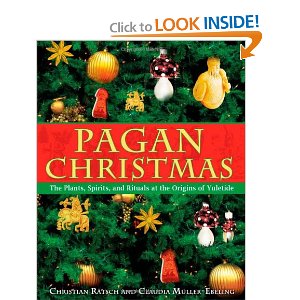Christian extremists like to blather on about a war on Christmas. Given that my post “Take Your ‘War On Christmas’ Talk And Shove It” has been getting a lot of traction on Facebook this week, I think it’s time for a history lesson.
Mood music:
[spotify:track:0P2vAvvWni2tNXOdbH3JFk]
We hear a lot about how Christmas is a Christian holiday, which it is, but important facts are being forgotten. One is that Jesus wasn’t actually born on Dec. 25. Another is that many of our Christmas traditions—the lights, decorations and gatherings—originated with pagan cultures.
One reader, John Conner, commented to that effect yesterday. He said:
This whole controversy is bogus to begin with. Any biblical scholar worth his or her salt will tell you that Jesus WAS NOT born on Dec. 25. That is the date of the pagan feast of Yule, closely following the winter solstice a few days prior. Many, many traditions celebrate Dec. 25 as a holy day, not just Christians.
On the Christian History website, Elesha Coffman wrote that for Christianity’s first three centuries Christmas wasn’t even celebrated. She wrote:
If observed at all, the celebration of Christ’s birth was usually lumped in with Epiphany (January 6), one of the church’s earliest established feasts. Some church leaders even opposed the idea of a birth celebration. Origen (c.185-c.254) preached that it would be wrong to honor Christ in the same way Pharaoh and Herod were honored. Birthdays were for pagan gods.
The Yule holiday is rooted in German paganism. Modern-day Wiccans still celebrate the winter solstice as a time of rebirth.
Coffman wrote that Dec. 25 also marked two other festivals: natalis solis invicti, the Roman “birth of the unconquered sun”, and the birthday of Mithras, the Iranian “Sun of Righteousness.” Since pagans were already celebrating deities with some parallels to the true God, Coffman wrote, church leaders decided to commandeer the date and introduce a new festival.
Remolding pagan traditions into a Christian holiday was pretty clever. You might even say it was devious. Either way, it turned out for the good. December is now a time where a melting pot of faiths and cultures celebrate the best of humanity: our charitable instincts, a trust in a higher power and the desire to see good win out over evil.
I choose to celebrate as a Catholic grateful that Christ was brought into this world, giving us all a shot at redemption. But I refuse to embrace the notion among today’s Christian leaders that Christmas has been hijacked by a collection of pagans who deny Christ’s divinity.
It was the other way around, many centuries ago.
My more-extreme Christian brothers and sisters need to get over it.

Pagan Christmas: The Plants, Spirits, andRituals at the Origins of Yuletide

Great post Bill! Good timing too. I was just having a conversation along these lines earlier today. Your blog was much better researched than my poor memory.
Kudos to you from a Pagan family member.
Great post. I wish more people understood this!
Well said! Merry Christmas to you! Happy Winter to me! Peace on earth & love to all.
Light can’t mix with darkness…you can’t serve two masters you will love one and hate the other you need to do more research on the topic Mr …you think being clever and devious bowing down to a tree and all its paraphernalia is clever Mr Catholic grateful …changing the Sabbath to sol Sunday is clever …Who you and your ilk is trying to outsmart, The Almighty?!! Jeremiah 10:2-4